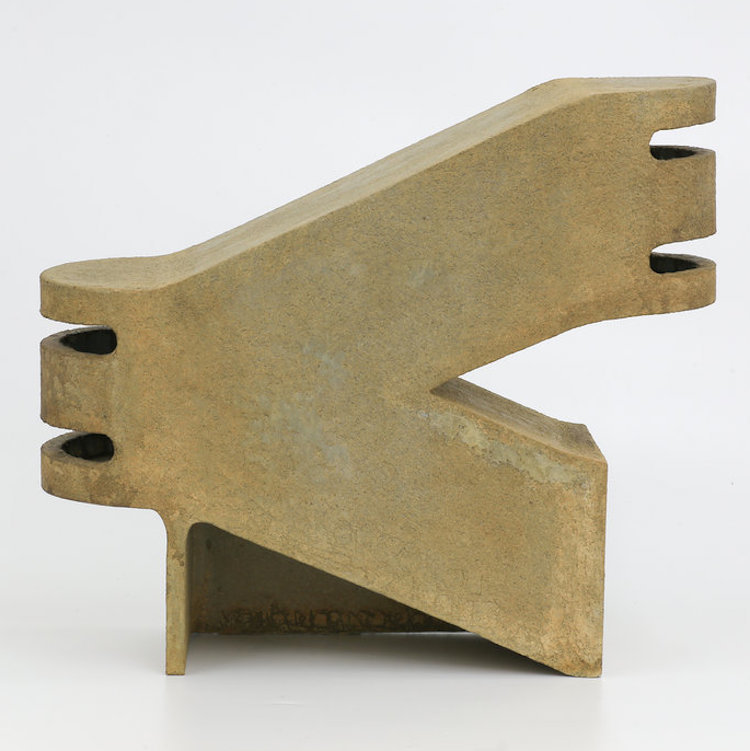SAN FRANCISCO — Nebraska, Ratio 3’s exhibition of Oakland-based artist Ben Peterson (January 17 – February 28), should tug at something inside anyone who’s ever lived in the Midwest. Peterson himself was born in Nevada, but the same rule applies there (perhaps even more, in the lonelier sections of the state). The ceramic works have the look of an old farm or process building one glimpses at 2 a.m. as they drive home on an unlit back road.
Above image: Ben Peterson, The Sentinels No. 1, 2015; ceramic and paint, 15 1/4 x 17 x 5 1/2 inches
Shirley Jackson once wrote about buildings keeping secrets. She was talking about an old mansion, but her words can certainly apply to these types of buildings— aloof grain silos, meat processing plants and mills. These are buildings that are unattractive not because an architect failed, but because they don’t care if human beings find them attractive. They exist for work only and, once five o’clock rolls around, they wait sullenly in the dark for the next day to begin. And what happens (as so often does in the Midwest) when the owner throws a chain over the front gate and goes home forever? Can you attribute feelings of resentment, even malice, to a building like that? What is it hiding in its lair off the highway? what does it do all day, alone and half-buried in weeds?

Ben Peterson, Nebraska, 2014, ceramic and paint, 15 x 11 1/4 x 14 1/2 inches. Click to see a larger image.

Ben Peterson, Nowy Swiat, 2014, ceramic and paint, 17 1/4 x 13 x 9 3/4 inches. Click to see a larger image.
The Midwest has its own gothic sensibility and it’s difficult to describe to people who haven’t seen it. The temptation for outsiders (and not that I blame them) is to get in their cars and head for the coasts in an attempt to drink up as little of the dingy gray atmosphere as possible. But there’s a dark romance hidden in buildings like these. They evoke so much, not even requiring you to understand what their original purpose was. Nebraska, the title piece of the exhibition, reminds me of one of my favorite buildings along an otherwise abandoned highway in Ohio. My building is several storeys of crumbling concrete with rusted metal chutes hanging from the upper windows. I haven’t a clue what it was used for, but I am drawn to its shape and I project all kinds of strange, sinister theories as to why it needs metal chutes leading into an overgrown field. Nebraska’s snaking chute or covered walkway recalls that building for me. The lopsided extension on the other side looks just out of place enough to coax theories: “Why is this strange feature there and what goes on inside to necessitate it?”
Sight Unseen, in their review of the show, say that Nebraska was one of the earliest states to have concrete buildings, modernist utilitarian structures. Peterson uses the gritty matte surface and general shape of the sculptures to put us in the mind of the real ones, but they’re not strictly modeled after the real thing. There are departures, such as in Nebraska. I love that he did this because of that sense of mystery I described earlier. One brutalist structure, La Otra Escena is both familiar and alien for this reason. The farmers are communing with some unnatural influence, building massive concrete bunkers for god knows what reason. The Sentinels look like retro futurist walkways you’d find in an abandoned mall, but their bulk and title demand that you throw your imagination to something of a much larger scale, to a larger purpose that is now mouldering along with whatever sits inside the concrete walls. Sometimes these departures fall flat. The building that looks like a brutalist rendition of Snoopy is a little too much, but on the whole, if these were real buildings, I’d feel tempted to drive out to see them after midnight. I’d be tempted to throw a grab a flashlight and a dark hoodie and jump over a fallen down section of the fence, asking “What are you?” as I take pictures in the dark.
Bill Rodgers is the Managing Editor of cfile.daily.
Do you love or loathe these works of contemporary ceramic art? Let us know in the comments.





Beautiful work!